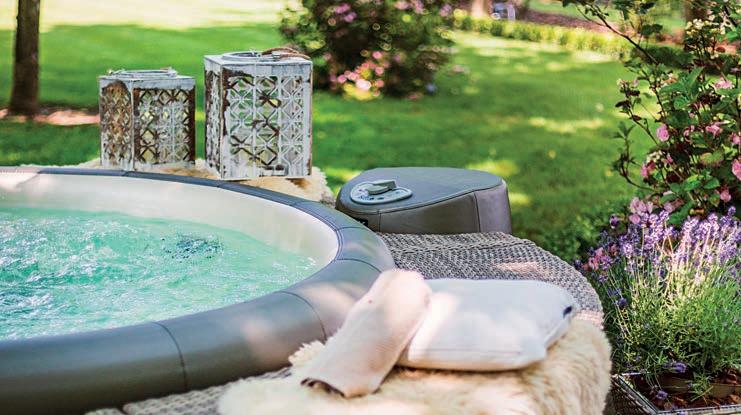When shopping for a new spa for your home, it's essential to explore the alternative options to hot tubs available on the market. Purchasing a hot tub entails a substantial investment of both time and money. While hot tubs offer numerous advantages, they also have certain drawbacks. To facilitate your decision-making process, below are some of the most effective alternatives to hot tubs.
Why Do You Need A Hot Tub?
Once you've experienced the relaxation of a hot tub, you'll understand why owning one is worth considering. It is undeniably enjoyable, and in addition to promoting relaxation, it also provides significant health benefits.
- Hydrotherapy is particularly effective for those suffering from Fibromyalgia by reducing muscle pain in the ligaments and tendons. In one study, fibromyalgia patients were given therapeutic whirlpool baths twice a week for six weeks. Upon the study's conclusion, the patients had better muscle and joint function, reduced pain symptoms, and improved sleep quality.
- Hydrotherapy assists significantly in the dilation of blood vessels, which increases circulation and helps people with muscle or joint pain by delivering oxygen and enzymes to the pain sites.
- Performing exercises in your Softub allows unrestricted movement for water aerobics, which greatly improves joint mobility and has the positive effect of increasing blood circulation. This naturally releases endorphins into the bloodstream, which serve as a natural pain reliever.
- Choose from the various levels of massage created by the adjustable jets, which assist in loosening knots of tension and enhancing the muscle range of motion.
- The National Sleep Foundation states, "Soaking in hot water, such as a hot tub, before retiring can ease the transition into a deeper sleep."
It always seems like the most pleasurable things are unhealthy, but that's not true when it comes to soaking in a hot tub!
"Spas are wonderful, so what could be the reason for searching for an alternative to a hot tub?"
When considering hot tub alternatives, it is essential to weigh the benefits against the drawbacks of traditional hot tubs. While hot tubs can offer health benefits and relaxation, they have significant downsides. They are expensive to purchase and install, cumbersome to move or transport, tricky to maintain, and can rack up large ongoing operational costs. These factors may deter some individuals from incorporating hot tubs into their outdoor spaces.
The significant financial commitment of purchasing a hot tub often deters many individuals, prompting them to seek alternative options. When faced with the prospect of investing $7,000 or more, it is only natural for individuals to explore more cost-effective and efficient allocation of their financial resources.
The sensation of indulgence experienced while immersing oneself in a perfectly heated hot tub may be alluring, but it is important to consider other options.
Consider the following alternatives to hot tubs if you seek a method to combine relaxation and health benefits.
Softub Spas
Softub Spas are a type of hot tub that offers an alternative to traditional spas. They are designed to address the drawbacks associated with traditional spas, providing a unique and improved spa experience.
Softub Spas are crafted using advanced lightweight materials, allowing for effortless portability. They can be rolled into place and require only a flat surface, offering unparalleled convenience. This means you can take your Softub Spas wherever you desire without the time, money, and hassle of preparing a site for a traditional hot tub.
Softubs are designed to be connected to a standard power outlet and boast exceptional energy efficiency. This feature results in potential monthly savings of between $30 and $65 in electricity expenditures.
Softub Spas offers exceptional value, featuring the top-of-the-line Portico model priced at under $9,000!
Swimming Pool
Water is an incredible force of nature, and if you're seeking an alternative to a spa, a swimming pool could be the perfect choice. A swimming pool offers unique health benefits compared to a hot tub, and there's nothing quite like the refreshing exercise of a good swim. However, it's essential to consider that a swimming pool shares some of the downsides of a spa, such as high costs (with the average pool priced at $35,000), logistical challenges, and ongoing maintenance expenses. Ultimately, choosing between a swimming pool and a hot tub depends on personal preferences rather than minimizing disadvantages.
Sauna
Infrared saunas offer many remarkable health benefits, including improved circulation, stress relief, and detoxification. If you're seeking an alternative to a hot tub, an infrared sauna is a compelling option, especially for those who prefer to avoid water immersion. In terms of pricing, it falls within the same range as Softub Spas, making it a manageable investment compared to a traditional hot tub.
However, it's crucial to consider the spatial requirements. Unlike the adaptable Softub Spas, an infrared sauna demands ample space. If space isn't a constraint, an infrared sauna can serve as an outstanding substitute for a hot tub, providing a unique and beneficial experience.
Steamroom
Another fantastic hot tub alternative is a steam room. It offers a combination of health benefits and luxurious relaxation that's hard to beat. A shower steam room combo typically costs between $4,000 and $6,000 for the unit plus installation and can be a great way to upgrade your bathroom. This can be an excellent use of your existing space and provide you with a hot tub alternative at a similar cost.
Conclusion: Hot Tub Alternatives
If an indulgent soak in a hot tub has sparked your desire to acquire one, it can be challenging to dismiss the notion. Fortunately, a solution exists that amalgamates the advantages of a hot tub while mitigating its limitations. Softub Spas presents an optimal fusion of performance, practicality, and value. It is highly recommended that you thoroughly consider Softub Spas prior to exploring alternative hot tub options.

